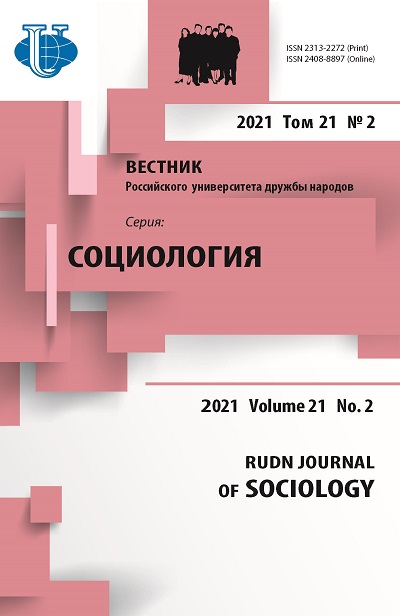Project employee as a new type of personality
- Authors: Barkov S.A.1, Romantseva E.E.2
-
Affiliations:
- Moscow State Lomonosov University
- RUDN University
- Issue: Vol 21, No 2 (2021)
- Pages: 403-414
- Section: Sociological lectures
- URL: https://journals.rudn.ru/sociology/article/view/26826
- DOI: https://doi.org/10.22363/2313-2272-2021-21-2-403-414
Cite item
Full Text
Abstract
Changes in the ways and forms of joint activity are usually evolutionarily: society changes and begins to ‘produce’ people capable of reproducing it. First of all, these are changes in the social role of the worker, which is performed today in a completely different coordinate system, under uncertainty and constantly changing ‘rules of the game’. There are the following new trends in the labor market: the disappearance of mass employment and development of precarious employment, the replacement of traditional labor relations with contractual ones, an increase in the worker’s autonomy, and the transformation of preferences in the field of career building. At the same time, the role and demand for project activities in almost all areas of society are increasing for such activities can satisfy the needs of the contemporary person, including his interaction with other people. The project is not just a mechanism for achieving a specific goal, but a universal way of organizing the life world, which contributes to the emergence of special types of social interaction and individual self-realization. The ‘project way of life’, project thinking, and project perception of reality are developing. The project as a social phenomenon becomes an organizing principle not only in professional activity, but also in everyday life. The authors use the method of sociological typification which consists of identifying a type (ideal, social) that combines the most important characteristics of people belonging to a particular group. To explain the combination of these characteristics, the authors consider the social context of their development. The conducted analysis allows to identify a new social type - the project worker with a special combination of professional and personal qualities.
About the authors
S. A. Barkov
Moscow State Lomonosov University
Author for correspondence.
Email: socorgmen@yandex.ru
доктор социологических наук, заведующий кафедрой экономической социологии и менеджмента
Leninskie Gory, 1-33, Moscow, 119192, RussiaE. E. Romantseva
RUDN University
Email: romantseva-ee@rudn.ru
старший педагог дополнительного образования филологического факультета; соискатель кафедры социологии факультета гуманитарных и социальных наук
Miklukho-Maklaya St., 6, Moscow, 117198, RussiaReferences
- Anisimov R.I. Trud v epokhu neopredelennosti [Labor in the era of uncertainty]. Sociological Studies. 2017; 11. (In Russ.).
- Bauman Z. Individualizirovannoe obschestvo [The Individualized Society]. Moscow; 2002. (In Russ.).
- Bashmakov V.I. Upravlenie sotsialnim razvitiem personala [Management of the Personnel Social Development]. Moscow; 2012. (In Russ.).
- Berger P., Luckmann T. Sotsialnoe konstruirovanie realnosti [The Social Construction of Reality]. M., 1995. (In Russ).
- Bourdieu P. Sotsialnoe prostranstvo i genezis “klassov” [The social space and the genesis of groups]. Voprosy Sotsiologii. 1992; 1. (In Russ.).
- Burlutskaya M.G., Kharchenko V.S. Frilansery: spetsifika sotsialnogo statusa, strategii kariery i professionalnogo razvitiya [Freelancers: The specifics of social status, career strategy and professional development]. Zhurnal Sotsiologii i Sotsialnoy Antropologii. 2013; 16 (1). (In Russ).
- Bagueley F. Upravlenie proyektom [Project Management]. Moscow; 2002. (In Russ).
- Weber M. O nekotorykh kategoriyakh ponimayushchey sotsiologii [Some categories of interpretive sociology]. Zapadnoevropeyskaya sotsiologiya kontsa XIX — nachala XX veka. Moscow; 1996. (In Russ).
- Gellner E. Usloviya svobody. Grazhdanskoe obshchestvo i ego istoricheskie soperniki [Conditions of Liberty. Civil Society and its Rivals]. Moscow; 2004. (In Russ).
- Kalinina G.N., Rybalkina P.V. Proektnoe myshlenie i “chelovek proektiruyushchy” (filosofsko-kulturologicheskaya eksplikatsiya) [Project thinking and “projecting man” (philosophical-culturological explication)]. Chelovek i Kultura. 2018; 5. (In Russ).
- Kormakova V.N. Zhiznennye strategii v sisteme professionalnogo samoopredeleniya lichnosti [Life strategies in the system of personal professional self-identification]. Nauka. Iskusstvo. Kultura. 2016; 1. (In Russ).
- Pink D. Natsiya svobodnykh agentov: kak novye nezavisimye rabotniki menyayut zhizn Ameriki [Free Agent Nation: How America’s New Independent Workers are Transforming the Way We Live]. Moscow; 2005. (In Russ).
- Popel A.A. Teoreticheskie podkhody k traktovke sotsialnoy kreativnosti v otechestvennoy i zarubezhnoy nauke [Theoretical approaches to the interpretation of social creativity in Russian and foreign science]. Vestnik Nizhegorodskogo Universiteta im. N.I. Lobachevskogo. Seriya: Sotsialnye Nauki. 2015; 4. (In Russ).
- Sorokin P.A. Sistema sotsiologii. Sotsialnaya analitika [System of Sociology. Social Analytics]. Syktyvkar; 1991. (In Russ).
- Smirnov P.I. Osnovnye sotsialnye tipy lichnosti [Basic social types of personality]. Vestnik Sankt-Peterburgskogo Universiteta. Seriya 6. 2005; 4. (In Russ).
- Toffler A. Shok budushchego [Future Shock]. Moscow; 2002. (In Russ).
- Handy Ch. Slon i blokha: Budushchee krupnykh korporatsiy i melkogo biznesa [The Elephant and the Flea: Reflections of a Reluctant Capitalist]. Moscow; 2004. (In Russ).
- Shevchuk V.A. O budushchem truda i budushchem bez truda [On the labor’s future and the future without labor]. Obshchestvennye Nauki i Sovremennost. 2007; 3. (In Russ).
- Shipilov A.V. Zhizn bez truda? Eto estestvenno [Life without labor? It’s natural]. Sotsiologichesky Zhurnal. 2019; 25 (2). (In Russ).
- Schepanskiy Ya. Elementarnye ponyatiya sotsiologii [Elementary Concepts of Sociology]. Moscow; 2003. (In Russ).
- Shcherbina Ya.Yu. Chelovek proektiruyushchy v sovremennom mire [Projecting man in the contemporary world]. Filosofiya Khozyaystva. 2016; 3. (In Russ).
- Jung C.G. Psikhologicheskye tipy [Psychological Types]. Saint Petersburg–Moscow; 1995. (In Russ).
- Yakubovsky A.E. Sotsialny tip — gipoteza i instrument issledovaniya sotsialnoy struktury [Social type — hypothesis and instrument for the study of social structure]. Sociological Studies. 2001; 4. (In Russ).














